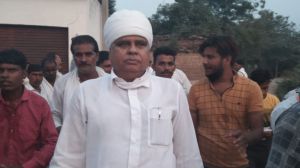Pause for questions
This is a deeply mixed moment, the day after the Indian Parliament expelled 11 MPs after a sting operation freezeframed them as they accepte...

This is a deeply mixed moment, the day after the Indian Parliament expelled 11 MPs after a sting operation freezeframed them as they accepted cash for questions. In retrospect, the decision was foretold ever since those grimy visuals first played out in drawing rooms across the nation, and then replayed again and again. There they were, our honourable MPs, accepting embarrassingly petty amounts in bribes to ask fake questions in Parliament. There they were, lowering the dignity of the House and of the people who reposed their trust and their vote in them. Once it was all on television, what could possibly be the reason for more thought, or delay? The ethics committee in Rajya Sabha and the committee of members in Lok Sabha were rendered into mere formalities, we may as well have pressed the fast-forward button on their deliberations. In the event, as both committees came out with their decisions in a matter of days 8212; the scam was on air on December 12, the decision was with us on December 23, just before both Houses adjourned sine die 8212; there8217;s a nagging suspicion. Did someone really press that fast-forward button?
To go back to the beginning, the cash-for-questions expose provoked only revulsion. But the expulsion of MPs after a process that looked exceedingly fleetfooted raises some questions that will not be ignored 8212; because they concern the highest forum of debate in the land, and because this decision sets a precedent for Parliament of the future as well as the state legislatures. True, Parliament has shown a will to regulate its own members and this is a valuable outcome of this sorry saga. Yet, the question of due process voiced by some prominent BJP MPs merits a serious hearing 8212; it must not be dismissed simply because the party has the most number of expelled MPs. After all, the process that leads to a decision which overrides, even reverses, the sovereign will of the people, must itself be 8212; and be seen to be 8212; above the suspicion of lack of fairness or due diligence. In this context, the proper constitution of the committee empowered to pronounce on a breach of privilege, the paces it must necessarily go through, and the degree of punishment it can mete out for a specified crime, are questions that deserve more thought.
Let8217;s not pretend the matter ends here. Let8217;s talk, also, about those other things that need to be done 8212; be it the codification of parliamentary privileges and immunities or the institution of transparency in the funding of parties 8212; to ensure that the next time this happens, there is more clarity, less ambivalence.
- 01
- 02
- 03
- 04
- 05































